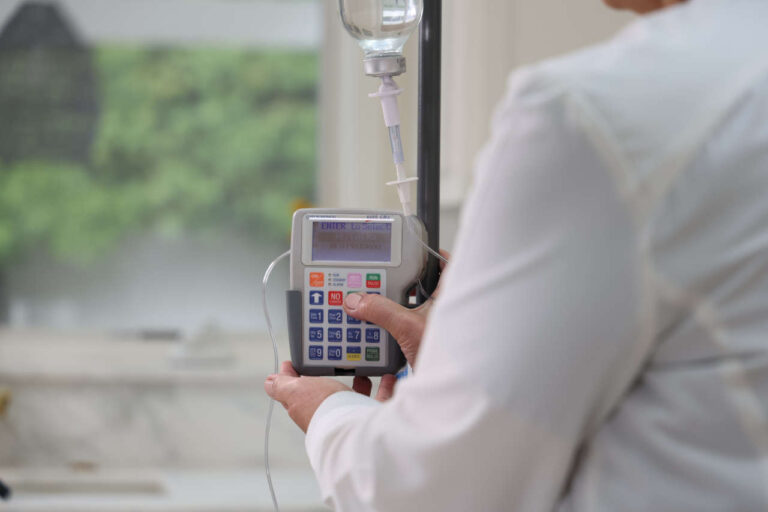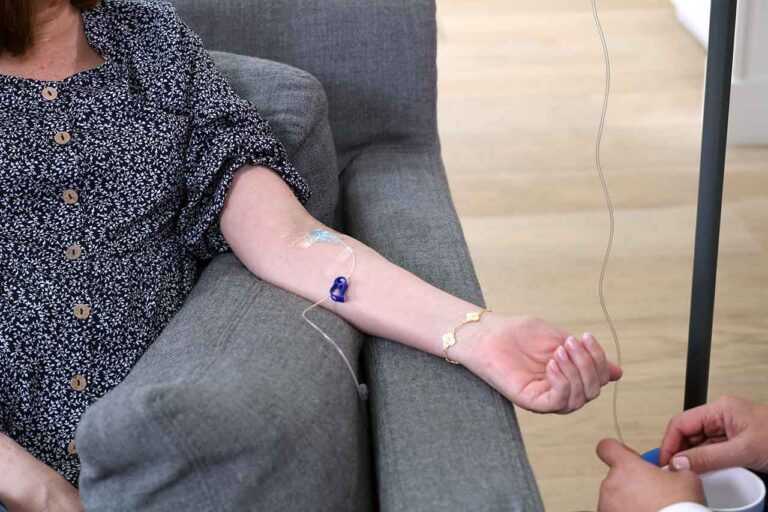
Fluid retention is a condition that occurs when the body is unable to maintain its fluid balance. As a result, excess fluid accumulates or is trapped inside the body’s tissues. This condition is known as edema, and it is often restricted to particular locations, affecting any body area, such as the legs, ankles, feet, or hands.
Ask About IVIG Home Infusion
Does IVIG cause fluid retention? IVIG therapy, which is a life-saving treatment for several inflammatory and immune-related disorders, can cause fluid retention in certain patients with other underlying conditions, such as heart and kidney problems.
Let’s review how IVIG therapy can cause fluid retention, what its initial symptoms are, and how you can manage this side effect.
IVIG and Fluid Retention: Basic Understanding
Generally, your body controls and regulates fluid (water) balance via a complex system. Hormonal factors, the liver, kidneys, cardiovascular system, and urinary system, all work together within this system to maintain fluid balance.
However, if there is a problem with any component of this system, your body fails to expel excess fluid as it should. When this happens, fluid starts to build up within the body’s tissues, causing swelling or puffiness in certain areas of the body, such as the legs or feet.
How IVIG Can Cause Fluid Retention
Fluid retention is one of the common side effects of IVIG therapy. Certain patients who received IVIG therapy experience fluid retention due to the following factors:
The Volume of IVIG Infusion
IVIG products contain large amounts of fluid, and depending on the prescribed dose and the patient’s weight, a significant volume of IVIG solution may be administered into the bloodstream. The higher the dose, the larger the volume of fluid that is delivered into the patient’s bloodstream.
For patients with heart and kidney problems, IVIG administered in larger doses does cause fluid retention because the extra fluid volume leads to fluid overload due to their organs not working properly. This disturbs the fluid balance in their body, leading to fluid accumulation in the body’s tissues.
Osmotic Load and Protein Content

Since IVIG solutions contain a high concentration of immunoglobulin G (IgG), the large amount of IgG antibodies exerts an osmotic pressure, which alters the fluid balance between blood vessels and tissues.
The high osmotic pressure causes fluid shift from the surrounding tissues into the bloodstream, leading to increased blood volume and fluid overload. In certain patients, this contributes to fluid retention when their heart and kidneys are unable to eliminate excess fluid from the body.
Immune Response and Inflammation
IVIG therapy may cause fluid retention due to the immune response it triggers. This therapy usually initiates an immune response that includes mild inflammation. The inflammation causes capillary leakage, resulting in fluid moving from small blood vessels into surrounding tissues, which leads to swelling.
Impaired Kidney Functions
Patients with impaired kidney functions are more likely to experience fluid retention during or after Paggamot ng IVIG. Since their kidneys do not function properly, they fail to remove excess fluids, which results in fluid retention in their body’s tissues.
Kumuha ng IVIG Copay Assistance
What Are the Signs and Symptoms of Fluid Retention?
The following are some common signs and symptoms of fluid retention that you may experience during or after IVIG treatments:
- Pagtaas ng timbang
- Swelling in the legs, ankles or feet
- Kinakapos na paghinga
- Decreased urine output
- Abdominal discomfort
Who Is at High Risk of Fluid Retention During or After IVIG Therapy?
IVIG therapy may cause fluid retention in those who:
- Have a history of heart failure and kidney disease
- Are older adults
- Are prescribed high dosages of IVIG infusions (a few hundred milliliters to several liters)
How Can You Manage Fluid Retention During or After IVIG Therapy?
You or your healthcare provider can take the following precautions to avoid fluid retention during or after IVIG therapy:
Monitor Fluid Intake and Output
You can monitor fluid intake and output during IVIG infusion to ensure your body processes IVIG solutions properly. However, if you see any unusual changes, such as decreased urination or swelling in feet or ankles, immediately consult your doctor.
Adjust Infusion Rate
You can adjust your infusion rate to avoid fluid overload. For example, slowing down the infusion in patients with heart or kidney problems can prevent the risk of fluid retention from IVIG by giving the body more time to eliminate excess fluids.
Mga gamot
In some cases, diuretic medications are prescribed to patients with heart or kidney diseases to manage fluid retention. Diuretics help the kidneys remove excess fluid and sodium from the body and into the urine, preventing fluid accumulation in the body’s tissues.
Kumuha ng Paunang Awtorisasyon ng IVIG
Konklusyon
It is important to always consult your healthcare provider before receiving IVIG therapy, especially if you have a history of kidney disease or heart failure. This way, your healthcare provider can optimize your treatment plan to reduce the risk of fluid retention during IVIG therapy.
Understanding that IVIG may cause fluid retention helps patients and providers take proactive measures to manage this side effect.
MGA SANGGUNIAN:
- Arumugham, V. B., & Rayi, A. (2023, July 3). Intravenous immunoglobulin (IVIG). StatPearls – NCBI Bookshelf. https://www.ncbi.nlm.nih.gov/books/NBK554446/#:~:text=%5B76%5D%20The%20most%20common%20of,or%20hypertension%2C%20and%20fluid%20overload.
- Duff, K. (2006). You can make a difference in the administration of intravenous immunoglobulin therapy. Journal of Infusion Nursing, 29(3), S5-S14.
- Cheng, M. J., & Christmas, C. (2011). Special Considerations with the Use of Intravenous Immunoglobulin in Older Persons. Drugs & Aging, 28(9), 729–736. https://doi.org/10.2165/11592740-000000000-00000
- Suzuki, H., Takeuchi, T., Minami, T., Shibuta, S., Uemura, S., & Yoshikawa, N. (2003). Water retention in the acute phase of Kawasaki disease: relationship between oedema and the development of coronary arterial lesions. European Journal of Pediatrics, 162(12), 856–859. https://doi.org/10.1007/s00431-003-1326-4
- Majeski, C., Taher, M., Grewal, P., Dytoc, M., & Lauzon, G. (2005). Combination of oral prednisone and intravenous immunoglobulin in the treatment of scleromyxedema. Journal of Cutaneous Medicine and Surgery, 9(3), 99–104. https://doi.org/10.1007/s10227-005-0137-9













